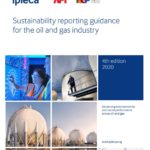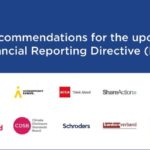A coalition of 17 socially responsible investment firms recommends that companies disclose social and environmental data using the Global Reporting Initiative.
Yesterday, 17 socially responsible investment (SRI) firms representing over $147 billion in assets issued a joint statement urging companies to disclose social and environmental information using Global Reporting Initiative (GRI) Sustainability Reporting Guidelines. Since its 1997 founding by the Coalition for Environmentally Responsible Economies (CERES) and the United Nations Environment Programme (UNEP), GRI has become the standard-bearer in "triple bottom line" (economic, environmental, and social) reporting.
"We support the GRI guidelines as the most comprehensive reporting framework available, and one that has gained broad credibility through a rigorous, global multi-stakeholder feedback process," stated the 17 firms. "We also believe the GRI guidelines provide a valuable tool for providing comparability and consistency across reports."
The coalition, coordinated under the Social Investment Forum (SIF), includes large SRI firms such as the Calvert Group, religious investors such as the Pension Boards of the United Church of Christ (PBUCC), Canadian SRI firms such as Ethical Funds, and SRI financial adviser firms such as Progressive Asset Management (PAM). The statement is also endorsed by SRI research firms such as Innovest Strategic Value Advisors, Michael Jantzi Research Associates (MJRA), and KLD Research & Analytics, as well as advocacy organizations such as the Interfaith Center on Corporate Responsibility (ICCR).
Steve Lippman, senior social research analyst at statement signatory Trillium Asset Management, characterized sustainability reporting using GRI guidelines as a "win-win" situation for companies and analysts (as well as other stakeholders). Analysts benefit from increased accessibility to information affecting investment decisions; companies can benefit by identifying potential risks that can be mitigated and potential liabilities such as energy inefficiencies that can save money by conservation.
"Our stakeholders look to us to disclose key environmental and social data so they can compare and judge our performance–it makes clear business sense for Intel to meet that need," said Dave Stangis, director of corporate responsibility at Intel (ticker: INTC). "Our shareholders and communities expect it, and it helps us improve our performance."
Intel is one of only a handful of US companies that have achieved "in accordance" reporting status, GRI’s most stringent reporting category requiring the board or CEO to sign off in certification. Other "in accordance" reporters include Dow Chemical (DOW), Ford (F), General Motors (GM), International Paper (IP), and Rio Tinto (RTP). Some 60 US companies are "declared users" of GRI (as opposed to companies that use GRI but do not notify GRI), and almost 600 companies worldwide declare their GRI usage. The SRI firms are trying to spur this number upward even further.
Some countries, to varying degrees, have chosen to require sustainability reporting. The Johannesburg Securities Exchange (JSE) in South Africa mandates GRI reporting by listed companies, and governmental regulation in Australia, France, and the UK explicitly require varying degrees of disclosure on social and environmental information.
Mr. Lippman would add the US to the list of countries mandating disclosure of environmental and social information, under Item 303 of US Securities and Exchange Commission (SEC) Regulation S-K, or Management’s Discussion and Analysis of Financial Condition and Results of Operations (MD&A).
"I would argue that, in fact, much of this disclosure is already mandated under SEC requirements that companies disclose material risks, which has been implemented very poorly and has been poorly enforced as well," Mr. Lippman said.
Mr. Lippman cited the example of greenhouse gas emissions, which represent a significant potential risk.
"Those are material issues that the GRI certainly picks up but far too few companies are disclosing in their 10-K forms," Mr. Lippman said.
Mr. Stangis offered a corporate perspective on this issue.
"Companies are taking a harder look at what goes into their 10-K and what might be considered material by their shareholders and investors, expanding some of that disclosure in the social and environmental space," Mr. Stangis said. "While I support a lot of this reporting some points in terms of disclosing better content in the 10K, I would oppose mandatory sustainability reporting, at least right now–I do not think it’s mature enough to put into a mandatory framework."
Ernst Ligteringen, CEO of GRI, agrees.
"Our view as the GRI is that sustainability reporting isn’t ready as a practice to be completely regulated, and if that was done prematurely, an incomplete work would be cast in stone," said Mr. Ligteringen. "Some companies fear the movement toward mandatory reporting, and our advice to them is, if you move forward in a voluntary way and actually demonstrate that voluntary reporting meets the needs of those seeking information and helps to increase transparency, chances are the calls for mandatory reporting would be less strong."



